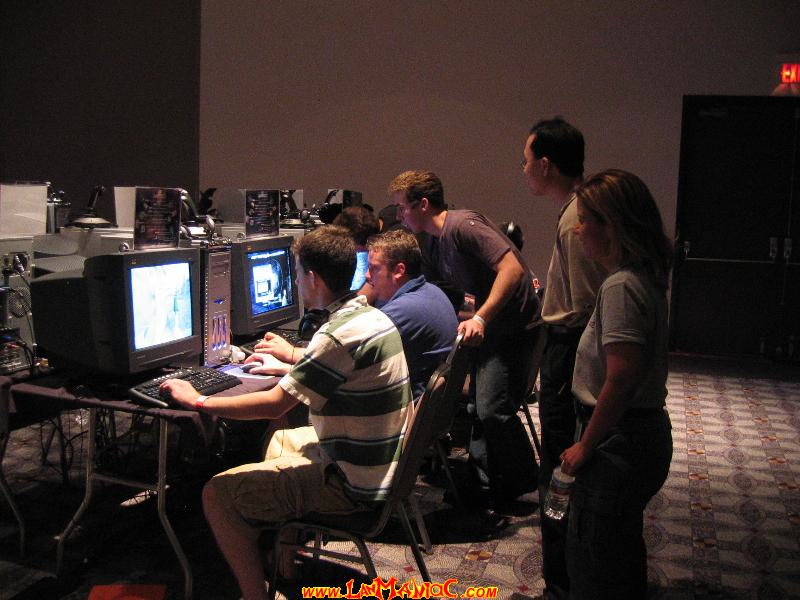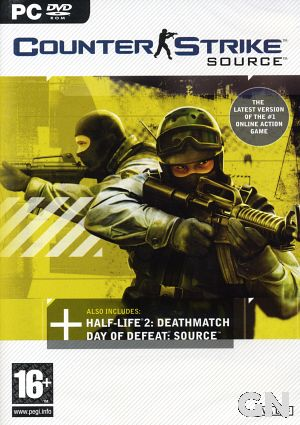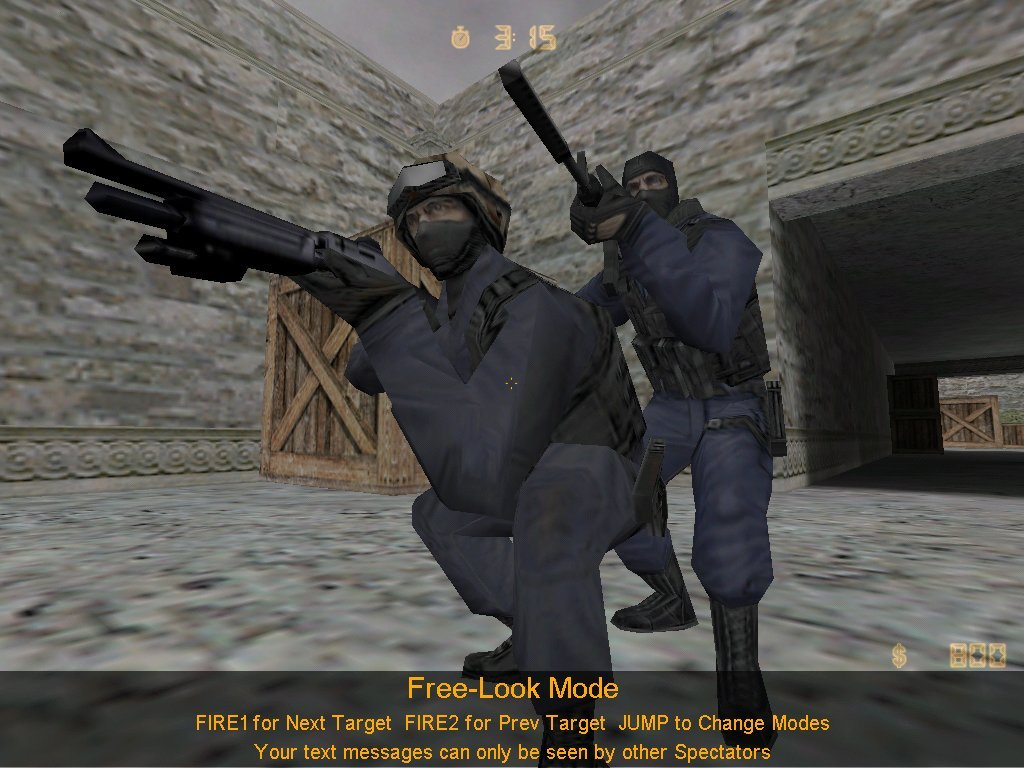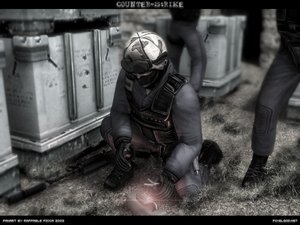Online Game Talk and the Articulation of Maleness
by: Avery Alix / University of Washington
Worthless, Misspelled Chatter
More than simply chatter, online talk between video game players involves the sharing of ideas, values and evaluations within a tortuous system of game mechanics, digital traditions, and wider cultural constraints. While these casual communications are easy to dismiss as unimportant or poorly articulated, it is worthwhile to render the underlying social work made by this discourse visible.
Like “African-American speech,” “woman's talk,” and other forms of marginalized speech discourse, online gamers' talk is often sneered at and looked down upon by those at the top of the Western hierarchy. Nonetheless, Kline & Alix (2003) report that online gamers rate the importance of communicating with other players more highly than they do exploration, teamwork, building characters or items, practicing skills, learning secrets, or even winning the game. Clearly, discourse in online games is widespread and significant to gamers, at the very least.
Player talk is torturously interspersed with slang and a mix of gaming and pop culture. Communication in this medium is often reciprocal, personal, informal, linguistically transgressive, spontaneous, publicly accessible, largely egalitarian, and can be oriented to accomplish tasks or to build relationships. While statements are often personal, they often indicate little personal identification with other players.
Messages are inter-textually linked to pop-culture and filled with disembedded references to broader cultural practice. Game utterances perform a wide variety of purposes and serve many forms of communicative goals from task orientation, to entertainment, to persuasion, to identity work.
The Expression of Maleness
To scale this down, let us constrain our focus to how people express male gender in casual talk. First, let us look at how socio-discursive power is employed to construct gendered identity in face-to-face talk, then let us see if these strategies are in use by game players.
Cameron (1997) suggests, “Gender has constantly to be reaffirmed and publically displayed by repeatedly performing particular acts in accordance with the cultural norms (themselves historically and socially constructed, and consequently variable) which define 'masculinity' and 'femininity'.” The near-constant labelling of others with sexualised pejoratives used by many players attests to that. These many comments both enforce and reinforce the heteronormative articulation of male sexual character.
Edley & Wetherell (1997) give us insight into this possibility when they discuss the construction of a sort of neo-masculinity enacted by their participants. In the traditional sense, machoism is often seen as a physical toughness demonstrated by athletes. Edley & Wetherell discuss a different perspective when the, “new definition of the wimp is centered around a distinction between two kinds of strength (or weakness); namely, physical and mental. Under this new definition, the wimp appears as someone who has neither of these attributes . . . In other words, the wimp is constructed as another kind of Other, a second reference point from which [a male] can differentiate himself. Like Jason and the Argonauts, [a male] and his friends can be seen carefully navigating a course for themselves between the Sculla of the macho man and the Charybdis of the wimp . . . betwixt and between, a diluted mixture of both.”

Discourse may play an even stronger role in the construction of maleness for online video game players than in face-to-face play, particularly because of the Cartesian dualism imposed in their play; where a player's physique and tangible presence are largely meaningless. While macho can be accomplished both physically and socially in the schools de Klerk studied, the physical accomplishment of macho in games is far more difficult. Granted, there is a degree of power and masculinity granted by dominating a server with one's skills, slaughtering other players, yet this act is only marginally macho because one need not be macho to accomplish it. World-champion chess players are not made macho by their accomplishments precisely because one may be (and stereotypically is) a scrawny geek and still manage the task. Likewise, it is only through discursive interaction that one can achieve masculinity in these digital play spaces. It is in the display of the mental and social toughness that maleness is articulated in the cyberspaces where the physical body is abstracted to the point where only the movement of the eyes and hands determines the winner. In other words, if the casual talk of people in face-to-face environments is significant, then online game interaction is likely even more important to identity-work despite the “anonymity” of the faceless internet.
Build Your Character
Let us look at an example. For the sake of ease, we'll use a simplified transcript from the game Counter-Strike. Here {FER} discursively articulates maleness by deriding other players' attempts to flirt with a female player.

1. {FER} : slick ur just as bad as these faggots trying to spit game online y u so goddamn interested
2. FordMustang : sumeone HOLAA
3. FordMustang : ahahah
4. FordMustang : shes young she doesnt know beter yet
5. FordMustang : imma pussy hungry feen
6. FordMustang : ahaha
7. {FER} : mustang dont get much do u
8. FordMustang : not really
9. FordMustang : i bet ive gotten more play then u
10. {FER} : yea cuz ur trying to mac online

{FER} (1) begins by socially policing the dialog. Interestingly, his comment, “[yo]ur['re] just as bad as these faggots trying to spit game online [wh]y [are yo]u so goddamn interested[?]” contains lexical choices that seem contradictory at first blush. The act of attempting to court a woman or girl hardly seems a “faggy” activity, yet he labels the female's suitors as faggots. While it is certainly reasonable to presume that the homophobic pejorative “faggots” is used as a generic and de-specified insult in this context. Cameron (1997) would contend that it is more likely, however, that “faggots” are simply male, yet emasculated sexual deviants, or those too sexually pathetic to comport their maleness as {FER} would like. As she writes, “the term 'gay' is not so much sexual deviance as gender deviance. Being 'gay' means failing to measure up to the group's standards of masculinity or femininity.”
{FER} comes on strong (7), making yet another threat to FordMustang's face by calling into question his sexual experience and success. He follows this inquisitively phrased declarative with another speculation that, as we've seen several times earlier, follows the pattern of insult -> insult -> appeal to discourse of expertise/experience. Added into this combo is {FER}'s proclivity for self-satisfied speculation and pseudo-deductive reasoning.
FordMustang weakly speculates (10) that he has had greater sexual “success” than {FER}, which is countered (11) by implying that flirting online is not the act of a sexually successful male.
Here we have {FER} articulating his own masculinity and performing the act of macho. He is a man, vociferously asserting and reasserting that he sees through the feeble and inappropriate attempts at masculinity performed by other players. He disdainfully does so by appealing to person prototypes of the expert, the sleuth, the assertive male, the competitor and the adult.

“It is in the social world that we learn what is desirable, which desires are appropriate for which kind of people and which desires are forbidden,” (Cameron & Kulick 2003, p131). {FER}'s interdiction into the advances of other male players demonstrates the expression of these underlying norms. The pejorative evaluation he levels at these flirtatious players is an expression of power serving the goal of group normalization. His vocalization of contempt for the transgressions of other males against his culturally informed norm is, itself, a performative achievement of the male, mature and macho. By proposing moral sanction against these “faggots” he simultaneously threatens their faces while other-ing them and performing identity work of his own.
Through discursive conflict, players struggle over ownership of power and maleness. Not content to express this struggle through the violent, macho and power-glorifying, yet impersonal medium of the game play itself, this verbal combat extends into chat. In this way, the conversational expression of male sexuality in games like Counter-Strike can sometimes metaphorically match the intense combat themes of the game itself.
Notes
[1] Labov's (2002) work looking at the creation of narratives in black American discourse offers a rationale for looking at online gamers as legitimate discourse community.
[2] Nicknames changed to maintain their anonymity.
[3] For more on “face” theory see Goffman (2002).
References
Cameron, D. (1997). Performing gender identity: Young men's talk and the construction of heterosexual masculinity, in S. Johnson & U. Meinhof (Eds.) Language and masculinity. Cambridge MA: Blackwell Publishers Ltd.
Cameron, D. & Kulick, D. (2003). Language and sexuality. Cambridge: Cambridge University Press.
Edley, N. & Wetherell, M. (1997). Jockeying for position: The construction of masculine identities. Discourse & Society 8(2): 203-217.
Goffman, E. (2002). On face-work: An analysis of ritual elements in social interaction, in A. Jaworski & N. Coupland (Eds.) (2002). The discourse reader. London: Routledge.
Klerk, V. de (1997). The role of expletives in the construction of masculinity, in S. Johnson & U. Meinhof (Eds.) Language and masculinity. Cambridge MA: Blackwell Publishers Ltd.
Kline, S. & Alix, A. (2003). Online gaming as emergent social media: A survey, preliminary report prepared from Internet results. Retrieved January 12, 2004.
Labov, W. (2002). The transformation of experience in narrative, in A. Jaworski & N. Coupland (Eds.) The discourse reader. London: Routledge.
Image Credits:
1. LAN Party
2. Counter-Strike Game
3. Counter-Strike screen capture
4. Fan art
Please feel free to comment.
I wonder how these types of discursive practices might compare to similar practices executed in non-digital text-based environments. I’m specifically thinking of a presentation I saw some years ago arguing that the vocabulary used to describe rock music helped to preclude the participation of women as rock critics.
As someone not particularly well-versed in online gaming or gameology, I was wondering what difficulties are encountered in attempting to find gamers’ conversation logs for analysis. Are the logs archived anywhere after the game is finished, or must the researcher actively monitor–and record–dialogues as they happen in-game? Additionally, is it important to verify (insofar as that is possible) the “real” identity of the gamers involved, to discover their actual gender, age, etc?
I find electronic worlds slightly differ due to physical intimidation. If someone isn’t literally in your face then the fear of a fight is settled in a different realm while the verbal fight can continue much like it would in the real world. Much like the non-electronic world, this type of ideology doesn’t matter to everyone. Sure, there are gamers that speak like ford but people will talk shit and that’s just the way the world works. Media makes it out so that males with more mates are generally better off while females that do the same are sluts. The same ideology is enforced through the minds of people playing videogames, snowboarding, babysitting or cooking. In the end it all comes down to the individuals themselves and not so much the realm in which he or she decides to express themselves.
LAN Video Game Party
Zeroservers has held a few of them also. I made one in boston. It was really good with free drinks and cookies. My kids loved it. Heres their link, they post in the forum when the sponsor the lan parties and where. http://zeroservers.net
A New Type Of Interaction
I believe that this new kind of “cyber intimidation” is just an evolution of how males have interacted with eachother for years. These taunts may seem to be strange and new, but the underlying fact is that men will always try to assume dominance over other males. In reality this can be done with some of the stereotypical male tropes of big muscles, a fast car, or being a “hit with the ladies”. But, like already said, none of these matter in cyberspace.
And as for this being a male only phenomena, I think believe that both men and women participate in cyber-talking. With the invention of Instant Messaging and Text Messaging, both men and women can speak to eachother in an immediately. There will always be gossiping and insulting others, but it has just been adapted for the internet. Women and men both do it. This might seem like a man-only affair because of the video game details, but “talking shit” is not gender specific.
In response to Carly, I think that your comment is really indicative of the sort of research I would like to see conducted comparing game play with other forms of media consumption.
In response to Nick, the short answer is “it depends.” In some games there are logs of all events, in other games certain players or administrators who know the program can obtain logs. In yet others, a workaround is the only way to obtain records of conversation. In this case, the game being played made verbatim logging quite simple for most players. Insofar as each player’s actual “real” identity, however, that is a much tricker metric to obtain outside a laboratory environment.
whats this it dosent look good make something beter then this
Thanks for some other informative site. Where else may just
I am getting that type of information written in such a perfect way?
I’ve a venture that I am just now running on, and I have been at the look out for such info.